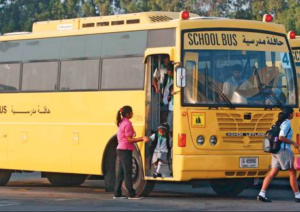Draft seat belt law does not cover school buses

Roads and Transport Authority regulations require only front seats and aisle seat in back row to have seat belts.
New seat belt regulations, part of a draft traffic law approved by the Ministry of Interior last month, will not cover school buses, Gulf News has learnt.
However, existing regulations, which require schools buses to have pupils buckled up on the front row as well as on the aisle seat in the back row, will continue to be in force.
According to the Roads and Transport Authority (RTA), Dubai’s school transport law requires some seats on school buses to have seat belts.
However, with reference to the new law, likely to be applicable from mid-June, a senior RTA official said that the authority will conduct a study and make changes if necessary.
“Two-point seat belts are available on all the passenger seats that are exposed from the front, such as the front seats and the middle seat of the last row and three point seat belts on the driver’s seat,” said Mohammad Al Ali, Director of Planning and Business Development at RTA’s Public Transport Agency. The rest of the seats in school buses don’t have seat belts.
Al Ali added that the law requires the transport operator to provide pre-school buses with three-point seat belts for all seats and a child safety seat system known as Universal Anchorage System (UAS).
The UAE’s biggest private school bus operator School Transportation Services (STS), already has all its buses equipped with seat belts.
Speaking to Gulf News, Colonel Augustine, managing director of STS, said that seat belts are necessary and provide an extra layer of safety to students.
“All our buses have seat belts because we feel they are necessary. Seat belts provide extra protection for students. But, what is more important is creating awareness. We have instances where some students don’t wear so we have trained attendants to help students wear seat belts,” said Col Augustine.
Spokespersons at the Federal Traffic Authority as well as the Dubai Police Traffic Department were not immediately available for comments.
Seat belts are mandatory on school buses as a standard feature of traffic law in most western countries, and a traffic safety campaigner in Dubai hoped the UAE will soon follow suit.
“We need to ensure students are buckled up in school buses. Firstly, we must protect our children ‘now’, meaning that in all school buses seat belts must be available. For the safety of our children, we hope this is anchored in the new law; we would be excited to see all UAE school buses equipped with seat belts,” said Thomas Edelmann, founder of roadsafetyuae.com.
He added that apart from having the law, children must be educated about buckling up whenever they are in a vehicle.
“We refer to school buses as ‘The Extended Classroom’, where the school bus driver and the school bus attendant who are both road safety experts, can teach kids in a hands-on real-life way how to buckle up. Children will establish good habits, which they will carry to other occasions, like when they get transported in their parents’ car or in the car of their friends’ parents,” he added.
He said that the educated children have the tendency to become ambassadors of knowledge and spread their knowledge to others, like to their siblings and friends, but also to parents.
The draft traffic law makes it mandatory for all passengers in a vehicle to wear seat belts failing which the driver will be fined Dh400 and four black points. However, it is not clear whether this law covers buses and minivans as well.
It is part of the UAE ‘Vision 2021’ that aims at lowering road fatalities from six per 100,000 inhabitants currently to three per 100,000 by 2021.
The draft law comes close on the heels of a recent survey which revealed that only 63 per cent drivers always buckle up, while among the front seat passengers only 52 per cent always buckle up.
The survey also shows that only 7 per cent buckle up when they sit in the back-seats.





